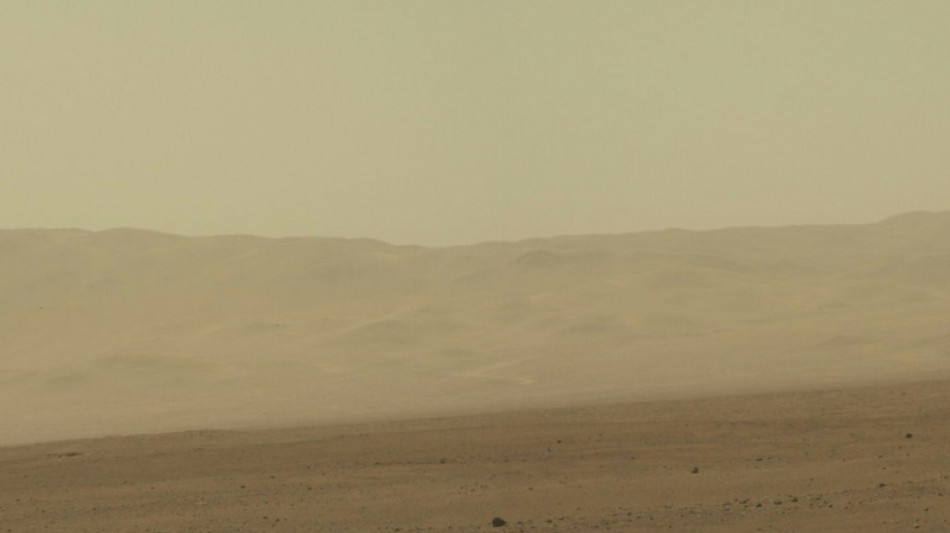
-
 New 'Wuthering Heights' film unleashes fresh wave of Bronte-mania
New 'Wuthering Heights' film unleashes fresh wave of Bronte-mania
-
US backs Pakistan's 'right to defend itself' after strikes on Afghanistan

-
 Bezzecchi beats Marquez to pole at season-opening Thailand MotoGP
Bezzecchi beats Marquez to pole at season-opening Thailand MotoGP
-
OpenAI strikes Pentagon deal with 'safeguards' as Trump dumps Anthropic

-
 Oscar-nominated 'F1' sound engineers recreate roar of racetrack
Oscar-nominated 'F1' sound engineers recreate roar of racetrack
-
15 dead as cash-packed military plane crashes in Bolivia

-
 Costa Rica's Grynspan pledges reform in bid for UN chief job
Costa Rica's Grynspan pledges reform in bid for UN chief job
-
Former All Black Bridge hailed for influence at Western Force

-
 'Sinners' vampires inspired by animals, says Oscar hopeful makeup artist
'Sinners' vampires inspired by animals, says Oscar hopeful makeup artist
-
For Oscar nominee Stellan Skarsgard, good cinema is like slow food

-
 'Brilliant industry' sees Reds down Highlanders in Super Rugby
'Brilliant industry' sees Reds down Highlanders in Super Rugby
-
Neil Sedaka, US singer and songwriter, dies age 86

-
 Paramount acquires Warner Bros. in $110 bn mega-merger
Paramount acquires Warner Bros. in $110 bn mega-merger
-
Rosenior eyes extended stay to stabilise Chelsea

-
 Spurs struggling physically admits Tudor
Spurs struggling physically admits Tudor
-
Lens held by Strasbourg in blow to Ligue 1 title chances

-
 NFL salary cap passes $300 mn for first time
NFL salary cap passes $300 mn for first time
-
Wolves secure rare win to dent Villa's bid for Champions League place

-
 Oil prices jump on Iran attack fears while US stocks fall
Oil prices jump on Iran attack fears while US stocks fall
-
Two dead, dozens injured as tram derails in Milan

-
 Trump tells US govt to 'immediately' stop using Anthropic AI tech
Trump tells US govt to 'immediately' stop using Anthropic AI tech
-
Court orders Greenpeace to pay $345 mn to US oil pipeline company

-
 IAEA stresses 'urgency' to verify Iran's nuclear material
IAEA stresses 'urgency' to verify Iran's nuclear material
-
UN urges action to prevent full civil war in South Sudan

-
 Hackers steal medical details of 15 million in France
Hackers steal medical details of 15 million in France
-
Susan Sarandon praises Spain’s stance on Gaza

-
 Murray adamant size isn't everything despite losing Wales place
Murray adamant size isn't everything despite losing Wales place
-
Messi knocked down by fan in Puerto Rico pitch invasion

-
 Two killed, dozens injured as tram derails in Milan
Two killed, dozens injured as tram derails in Milan
-
O'Neill taken aback by Rangers boss Rohl's comments on Celtic

-
 Ukrainian, Slovak leaders hold call amid energy spat
Ukrainian, Slovak leaders hold call amid energy spat
-
French hard-left firebrand sparks row with 'antisemitic' Epstein jibe

-
 Ahmed, Jacks blast England to thrilling win over New Zealand
Ahmed, Jacks blast England to thrilling win over New Zealand
-
UK police arrest man after Churchill statue sprayed with graffiti

-
 Bill Clinton denies wrongdoing at grilling on Epstein ties
Bill Clinton denies wrongdoing at grilling on Epstein ties
-
Red Cross urges Afghanistan-Pakistan 'de-escalation'

-
 Coup role revelations revive calls for return of Spain's ex king
Coup role revelations revive calls for return of Spain's ex king
-
Oil prices jump on Iran attack fears, Wall Street slips on AI

-
 TikTok disinformation: the other weapon in Mexico violence
TikTok disinformation: the other weapon in Mexico violence
-
Carmaker BMW to trial humanoid robots at German factory

-
 NASA announces overhaul of Artemis lunar program amid technical delays
NASA announces overhaul of Artemis lunar program amid technical delays
-
Golfer Pavan undergoes surgery after freak lift fall

-
 Bill Clinton faces grilling on extensive ties to Epstein
Bill Clinton faces grilling on extensive ties to Epstein
-
For Roberto Cavalli designer, dreams come in all black

-
 Macron to set out how France's nuclear arms could protect Europe
Macron to set out how France's nuclear arms could protect Europe
-
Spin-heavy England restrict New Zealand to 159-7 in Super Eights

-
 Starmer vows to fight 'extremes' after UK Labour election drubbing
Starmer vows to fight 'extremes' after UK Labour election drubbing
-
New Pokemon titles on horizon as 30th anniversary approaches

-
 Arteta backs Gyokeres to impact Arsenal's trophy charge
Arteta backs Gyokeres to impact Arsenal's trophy charge
-
55 Ghanaians killed after being lured into Ukraine war: govt


Why is there no life on Mars? Rover finds a clue
Why is Mars barren and uninhabitable, while life has always thrived here on our relatively similar planet Earth?
A discovery made by a NASA rover has offered a clue for this mystery, new research said Wednesday, suggesting that while rivers once sporadically flowed on Mars, it was doomed to mostly be a desert planet.
Mars is thought to currently have all the necessary ingredients for life except for perhaps the most important one: liquid water.
However the red surface is carved out by ancient rivers and lakes, showing that water once flowed on our nearest neighbour.
There are currently several rovers searching Mars for signs of life that could have existed back in those more habitable times, millions of years ago.
Earlier this year, NASA's Curiosity rover discovered a missing piece in this puzzle: rocks that are rich in carbonate minerals.
These "carbonates" -- such as limestone on Earth -- act as a sponge for carbon dioxide, pulling it in from the atmosphere and trapping it in rock.
A new study, published in the journal Nature, modelled exactly how the existence of these rocks could change our understanding of Mars's past.
- Brief 'oases' -
Lead study author Edwin Kite, a planetary scientist at the University of Chicago and a member of the Curiosity team, told AFP it appeared there were "blips of habitability in some times and places" on Mars.
But these "oases" were the exception rather than the rule.
On Earth, carbon dioxide in the atmosphere warms the planet. Over long timescales, the carbon becomes trapped in rocks such as carbonates.
Then volcanic eruptions spew the gas back into the atmosphere, creating a well-balanced climate cycle supportive of consistently running water.
However Mars has a "feeble" rate of volcanic outgassing compared to Earth, Kite said. This throws off the balance, leaving Mars much colder and less hospitable.
According to the modelling research, the brief periods of liquid water on Mars were followed by 100 million years of barren desert -- a long time for anything to survive.
It is still possible that there are pockets of liquid water deep underground on Mars we have not yet found, Kite said.
NASA's Perseverance Rover, which landed on an ancient Martian delta in 2021, has also found signs of carbonates at the edge of dried-up lake, he added.
Next, the scientists hope to discover more evidence of carbonates.
Kite said the best proof would be returning rock samples from the Martian surface back to Earth -- both the United States and China are racing to do this in the next decade.
- Are we alone? -
Ultimately, scientists are searching for an answer to one of the great questions: how common are planets like Earth that can harbour life?
Astronomers have discovered nearly 6,000 planets beyond our Solar System since the early 1990s.
But only for Mars and Earth can scientists study rocks which allow them to understand the planet's past, Kite said.
If we do determine that Mars never hosted even tiny micro-organisms during its watery times, that would indicate it is difficult to kick-start life across the universe.
But if we discover proof of ancient life, that would "basically be telling us the origin of life is easy on a planetary scale," Kite said.
P.Costa--AMWN

